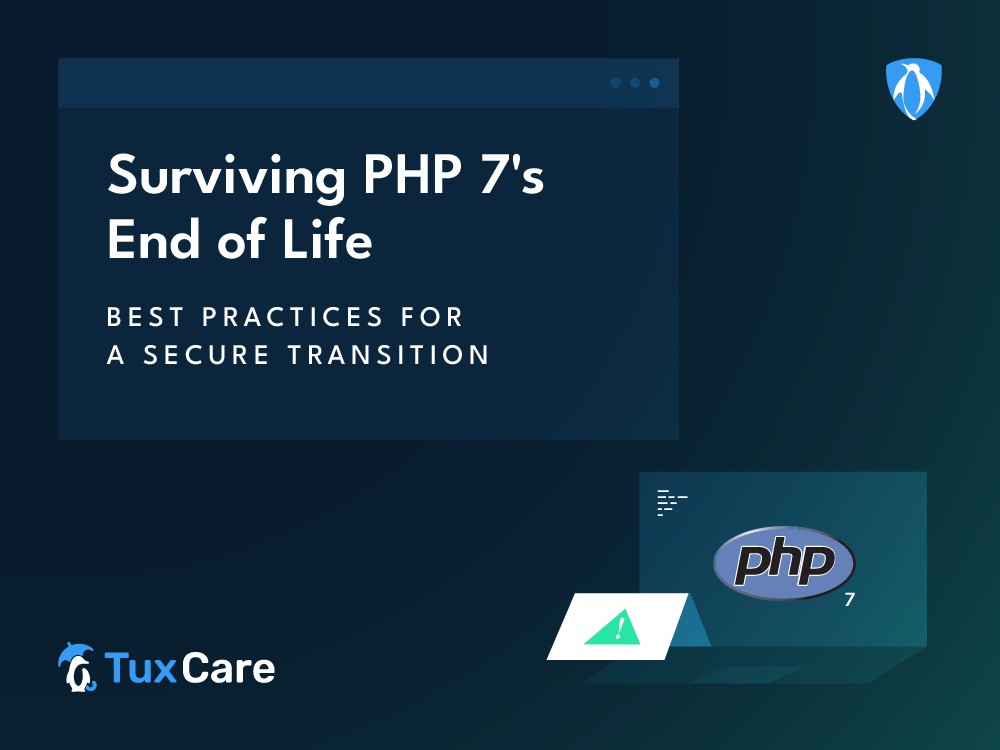Surviving PHP 7 End of Life: Best Practices for a Secure Transition
- According to W3Techs.com, more than 50% of all the PHP websites still use PHP 7 versions.
- Each PHP release branch has three years of support: 2 years of active support and 1 year of critical security fixes only.
- TuxCare’s PHP Extended Lifecycle Support (ELS) offers security updates and patches for end-of-life PHP versions.
PHP is a widely used server-side programming language for web development. Like many other programming languages, PHP also has a specific support lifecycle. Consequently, the development team stops providing support for older PHP versions after certain years of the initial release date. This also includes security updates and fixes to address known vulnerabilities and bugs. Therefore, using the PHP end-of-life versions may make your organization highly susceptible to exploits, putting applications and their users at greater risk of cyberattacks.
PHP 7.4, the last minor update of PHP 7, reached the end of life on 28 November, 2022. However, at the time of writing, 58.1% of all the PHP web applications are still found using PHP 7 versions, which is concerning. (W3Techs)
In this article, we will explore the implications of PHP 7 end of life and best practices to safeguard applications, ensuring a secure transition to the next supported release.
What Does PHP 7 End of Life (EOL) Mean?
The end of life for any software or programming language is the end of support from the official vendor after its specified end date. So, PHP 7 end of life means the PHP development team stops providing official support, including security updates and bug fixes, for a specific PHP 7 release branch.
Every PHP release branch receives full support for two years from its stable release date. During this time, reported bugs and security issues are addressed and made available in regular point releases.
After this two-year period, each branch receives an extra year of support for critical security issues only. Releases in this phase are made as necessary, depending on reported issues. Upon completion of the three-year support cycle, the branch reaches its end-of-life stage and ceases to receive further support.
All minor versions of PHP 7 (7.1, 7.2, 7.3, and 7.4) have reached end of life.
Understanding the Risks of PHP 7 EOL
With the EOL marking the end of official support and security updates, the risk of vulnerabilities in PHP 7 will increase over time.
Without security patches, vulnerabilities discovered in PHP 7 will remain unaddressed, leaving applications susceptible to exploitation by malicious actors. These vulnerabilities could range from code execution exploits to SQL injection attacks, potentially leading to data breaches, service disruptions, and reputational damage. Therefore, adopting best practices to maintain security during this transition is paramount.
Maintaining Secure Applications Post PHP 7 End of Life
If you are still using any PHP 7 versions, it is essential to plan a transition to the next long-supported version or opt for extended support until you can execute such a transition.
Upgrading to Supported PHP Versions
The most effective way is to simply upgrade to a supported PHP version, like PHP 8.2 or 8.3. However, upgrading can be a challenging and time-consuming task based on the source code of your applications.
Several functions and behaviors have been changed and removed along with multiple deprecations, which can break the application. Thus, it is essential to conduct a comprehensive code audit to identify and address deprecated issues as well as clean old codes and write new ones. The migrating process can be costly for organizations with lots of changes to be made to their applications.
Extended Lifecycle Support
If upgrading is not a feasible method, organizations can use PHP Extended Lifecycle Support (ELS) from TuxCare to ensure the security and compliance of their PHP 7 applications. TuxCare provides security support and vulnerability fixes for unsupported PHP versions, maintaining seamless continuity with your existing PHP codebase. With our PHP Extended Lifecycle Support (ELS), there is no need for re-coding.
Staying Informed & Community Engagement
Keep up with upcoming versions, changes, and security patches from the PHP development team. Additionally, PHP has an active and supportive community, so seek help from forums, documentation, and experienced developers. Sharing knowledge and collaborating can significantly ease your transition.
Final Thoughts
With PHP 7 end of life, prioritizing security is imperative for organizations to safeguard the integrity of applications. Remember, security is an ongoing process and not a one-time fix.
By implementing these best practices and maintaining a proactive approach, developers and organizations can ensure a smooth and secure transition to newer PHP versions. Proactive measures taken now can help safeguard against potential security breaches and maintain the trust of users and stakeholders in the long run.
Learn more about TuxCare’s PHP End of Lifecycle Support (ELS) and schedule a conversation with a TuxCare expert to get started.



 Documentation
Documentation Login
Login




